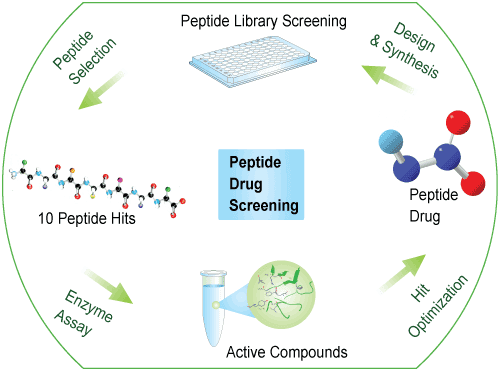Peptide libraries are essential tools in modern biological research and drug development. They offer a systematic way to explore the vast diversity of peptides, enabling scientists to identify novel biological activities, discover potential therapeutic agents, and advance our understanding of protein functions. Peptide library synthesis plays a central role in these processes, providing researchers with the means to create and analyze large collections of peptides for a variety of applications, from basic research to drug discovery.
In this article, we will explore the significance of peptide library synthesis, its applications, and how it contributes to the advancement of scientific exploration and drug development.
What is Peptide Library Synthesis?
Peptide library synthesis refers to the creation of a diverse collection of peptides—short chains of amino acids that can mimic portions of proteins or act as standalone molecules. These peptides are systematically synthesized using chemical or biological techniques, often in large-scale arrays, to cover a wide range of sequences and modifications. The resulting library can include millions of distinct peptides, providing a valuable resource for researchers to explore peptide-protein interactions, enzymatic activities, and potential therapeutic targets.
Peptide libraries are typically created through solid-phase peptide synthesis (SPPS), a method that allows for the controlled assembly of peptides by sequentially adding amino acids in a specific order. This technology, coupled with high-throughput screening techniques, enables researchers to efficiently generate and test vast numbers of peptides, significantly advancing drug discovery and other scientific endeavors.
Applications of Peptide Library Synthesis
Peptide libraries have a wide range of applications across various fields, from basic research to clinical drug development. Below are some of the key areas where peptide libraries are making an impact:
1. Drug Discovery and Development
One of the most significant applications of peptide library synthesis is in the discovery of new drugs. By screening large peptide libraries against specific biological targets, researchers can identify potential peptide-based drugs that may serve as enzyme inhibitors, receptor agonists or antagonists, or immune system modulators. These peptides can lead to the development of novel therapeutics for conditions such as cancer, autoimmune diseases, viral infections, and more.
- High-Throughput Screening: Peptide libraries enable high-throughput screening, where thousands or even millions of peptides are tested for activity against a particular protein or receptor. This approach accelerates the discovery of potential drug candidates.
- Targeted Therapy: Peptides can be engineered to bind specifically to disease-associated proteins, providing a more targeted and potentially less toxic treatment option compared to traditional small-molecule drugs.
2. Biomarker Discovery
Peptide libraries can be used to identify novel biomarkers for disease diagnosis, prognosis, and monitoring. By screening libraries of peptides against patient samples, researchers can uncover peptides that bind specifically to biomarkers associated with particular diseases. These peptides can then be used as diagnostic tools or in the development of biosensors for early disease detection.
- Cancer Biomarkers: Peptide libraries have been used to identify cancer-specific biomarkers, enabling the development of new diagnostic tests and therapies.
- Autoimmune Diseases: Peptides can also be used to find biomarkers associated with autoimmune diseases, potentially leading to earlier diagnosis and more personalized treatments.
3. Vaccine Development
Peptide libraries have proven useful in the development of vaccines, particularly in the identification of epitopes—small peptide fragments that are recognized by the immune system. By synthesizing large peptide libraries that represent different regions of a pathogen’s proteins, researchers can identify peptides that stimulate an immune response, helping to design more effective vaccines.
- T-Cell Epitopes: Peptide libraries allow for the identification of epitopes that can stimulate specific T-cell responses, which is crucial for designing vaccines against infectious diseases and cancer.
- Epitope Mapping: Researchers can use peptide libraries to map the epitopes on pathogens, which helps to identify the most immunogenic parts of the virus or bacterium.
4. Protein-Protein Interaction Studies
Understanding protein-protein interactions is crucial for deciphering cellular signaling pathways, gene regulation, and disease mechanisms. Peptide libraries provide a valuable tool for studying these interactions. By synthesizing peptides that correspond to specific regions of a target protein, researchers can investigate how these peptides interact with other proteins, receptors, or enzymes.
- Binding Affinity Studies: Peptide libraries can be used to determine the binding affinity between a peptide and its target protein, offering insights into the strength of their interaction.
- Allosteric Regulation: Peptide libraries can also help identify peptides that bind to allosteric sites on proteins, leading to a better understanding of how proteins function and are regulated within the cell.
5. Synthetic Biology and Protein Engineering
Peptide libraries are also useful in synthetic biology, where they enable the engineering of novel proteins with enhanced or customized functions. By exploring the diversity of peptides and protein domains, researchers can design proteins with new capabilities, such as improved stability, enhanced binding properties, or altered enzymatic activity.
- Enzyme Engineering: Peptide libraries can be used to identify peptides that enhance the catalytic activity of enzymes, creating more efficient biocatalysts for industrial applications.
- Functional Protein Design: By exploring various peptide sequences, researchers can create novel proteins that perform specific tasks, such as sensing environmental changes or producing biofuels.
Advantages of Peptide Library Synthesis
The synthesis of peptide libraries offers several advantages over traditional methods of drug discovery and research. Here are some of the key benefits:
1. Diversity of Sequences
Peptide libraries can cover a broad range of amino acid sequences, enabling researchers to explore a vast array of possible interactions and activities. This diversity increases the likelihood of identifying peptides that have the desired biological effect, such as binding to a target protein or inhibiting a specific enzyme.
2. High-Throughput Capability
With advances in peptide synthesis technology and screening techniques, researchers can now generate and test large numbers of peptides in a short period of time. This high-throughput capability accelerates the drug discovery process and enables researchers to screen peptides for a variety of functions simultaneously.
3. Customization and Flexibility
Peptide library synthesis is highly customizable, allowing researchers to design libraries with specific peptide modifications, such as phosphorylation, glycosylation, or incorporation of non-natural amino acids. This flexibility makes it possible to tailor libraries to suit specific research needs or to mimic the complexity of naturally occurring proteins.
4. Cost-Effective and Scalable
Peptide libraries can be synthesized in a cost-effective and scalable manner, making them accessible to a wide range of researchers and organizations. Advances in automated synthesis platforms and parallel synthesis techniques have significantly reduced the cost and time associated with generating peptide libraries.
Challenges in Peptide Library Synthesis
While peptide library synthesis offers numerous advantages, there are also challenges that researchers must consider:
- Sequence Complexity: The larger and more complex the peptide library, the more challenging it can be to synthesize and analyze. Ensuring uniformity and purity across the library is critical for reliable results.
- Screening Techniques: The effectiveness of a peptide library depends on the screening techniques used to identify active peptides. High-throughput screening methods must be carefully optimized to ensure accurate and meaningful results.
- Synthetic Limitations: Certain peptide sequences, particularly those involving non-natural amino acids or complex structures, can be difficult to synthesize or may require specialized techniques.
Conclusion
Peptide library synthesis is a powerful tool that has revolutionized scientific research and drug development. It enables the systematic exploration of peptide diversity, providing insights into protein functions, biomarker discovery, vaccine development, and therapeutic discovery. While challenges remain in terms of synthesis complexity and screening, advances in technology continue to make peptide library synthesis more efficient, scalable, and cost-effective. By harnessing the potential of peptide libraries, researchers are paving the way for new breakthroughs in biomedicine and beyond.

